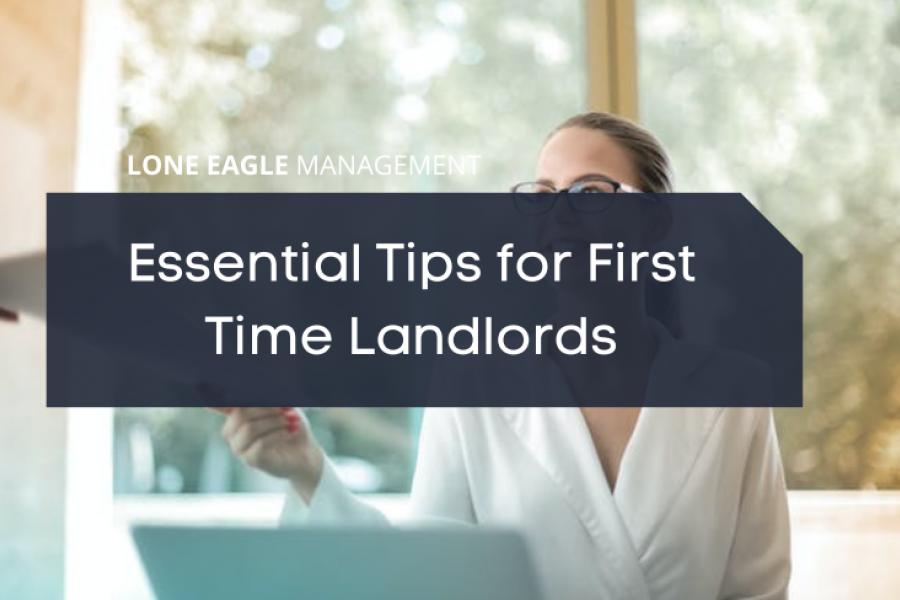
Deciding to become a landlord for the first time is both an exciting and challenging venture. Whether you're renting out a property as an investment or managing a single rental unit, there are essential tips and best practices that can help you navigate this new role effectively.
Here are some crucial tips by Lone Eagle Property Management for first-time landlords to ensure a smooth and successful experience!
1. Understand the Legalities
One of the first steps to becoming a successful landlord is understanding the legal requirements and regulations in your area. Landlord-tenant laws vary by state, city, and even county, so it's essential to familiarize yourself with local regulations.
Consult with a real estate attorney or property management professional to ensure that you are compliant with all relevant laws. This can help you avoid legal disputes and ensure that your rental practices are fair and lawful.
2. Create a Detailed Lease Agreement
A comprehensive lease agreement is a critical tool for protecting both you and your tenant. This document should clearly outline the terms and conditions of the rental arrangement, including:
- Rent amount and due date: Specify the monthly rent, when it's due, and any late fees.
- Security deposit: Detail the amount, how it will be held, and the conditions for its return.
- Maintenance responsibilities: Clarify who is responsible for repairs and maintenance.
- House rules: Include any specific rules about noise, pets, smoking, etc.
- Termination clause: Explain the process for ending the lease, including notice periods.
Having a well-defined lease agreement helps prevent misunderstandings and provides a reference point if any issues arise during the tenancy.
3. Screen Tenants Thoroughly
Finding the right tenant is crucial for a successful rental experience. A thorough screening process can help you select tenants who are reliable and respectful of your property. Consider the following steps:
- Credit check: Assess the applicant's financial stability and creditworthiness.
- Background check: Review their rental history, employment status, and any criminal records.
- References: Contact previous landlords and employers to verify the applicant's reliability and character.
- Interview: Meet with potential tenants to get a sense of their personality and suitability for your property.
By carefully screening tenants, you can minimize the risk of late payments, property damage, and other potential issues.
4. Set a Competitive Rent Price
Setting the right rent price is essential for attracting tenants and maximizing your rental income. Research the local rental market to understand what similar properties are charging. Consider factors such as:
- Location: Proximity to schools, public transportation, and amenities can affect rent prices.
- Property condition: Updated and well-maintained properties can command higher rents.
- Market trends: Stay informed about local rental market trends to adjust your pricing accordingly.

Setting a competitive rent price can help you attract quality tenants and reduce vacancy periods.
5. Maintain the Property
Regular maintenance and prompt repairs are essential for keeping your property in good condition and ensuring tenant satisfaction. Establish a maintenance schedule for routine tasks such as:
- HVAC servicing: Regularly check and service heating and cooling systems.
- Plumbing and electrical: Inspect and address any issues promptly to prevent larger problems.
- Landscaping: Maintain the exterior of the property to enhance curb appeal.
Encourage tenants to report maintenance issues as soon as they arise, and respond promptly to repair requests. A well-maintained property not only retains its value but also fosters a positive landlord-tenant relationship.
6. Communicate Effectively
Clear and open communication with your tenants is key to a successful landlord-tenant relationship.
Establish preferred communication channels and be responsive to tenant inquiries and concerns. Regularly check in with your tenants to ensure everything is going smoothly and address any issues promptly.
Effective communication can help prevent misunderstandings and build trust with your tenants, leading to a more positive rental experience for both parties.
7. Keep Accurate Records
Maintaining detailed records is crucial for managing your rental property efficiently and complying with legal requirements. Keep records of:
- Lease agreements: Store signed copies of all lease agreements.
- Rent payments: Track rent payments and any late fees.
- Maintenance and repairs: Document all maintenance requests and repairs, including receipts and invoices.
- Correspondence: Save copies of all communication with tenants.
.jpg)
Accurate records can help you manage your property more effectively and provide essential documentation in case of any disputes or legal issues.
8. Consider Professional Property Management
If managing your rental property becomes overwhelming, consider hiring a professional property management company. Property managers can handle various aspects of rental management, including:
- Tenant screening: Finding and vetting potential tenants.
- Rent collection: Ensuring timely rent payments and handling late fees.
- Maintenance and repairs: Coordinating and overseeing property maintenance.
- Legal compliance: Ensuring adherence to local landlord-tenant laws.
While property management services come at a cost, they can save you time and reduce the stress of managing your rental property.
9. Plan for Vacancies
Inevitably, there will be times when your property is vacant between tenants. Plan for these periods by setting aside funds to cover mortgage payments, utilities, and maintenance costs during vacancies.
Having a financial buffer can help you manage the property effectively even when it's not generating rental income.
Conclusion
Becoming a first-time landlord can be a rewarding experience if you approach it with the right knowledge and preparation. By following the above tips, you can navigate the challenges of property management and build a successful rental business.
Keep in mind that being a landlord is not just about collecting rent; it's about building positive relationships with your tenants and maintaining a property that they are proud to call home.
If you need help, it’s best to work with a professional property management company that can help you maximize your income. Talk to one of our experts at Lone Eagle Management.